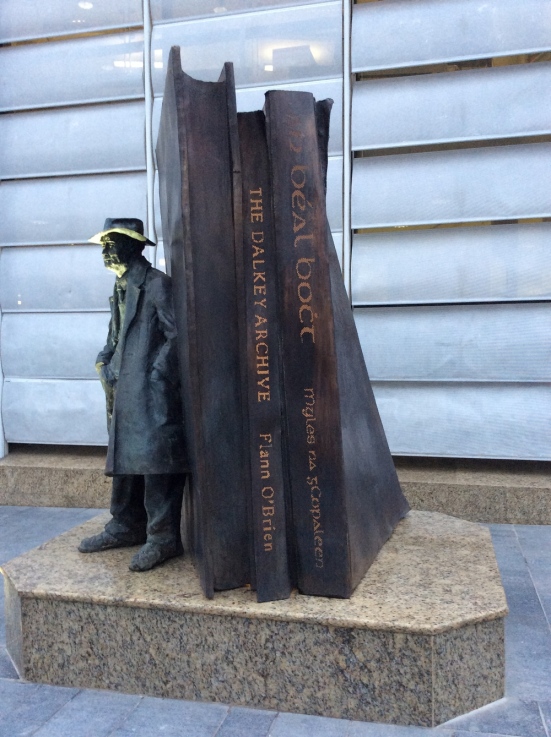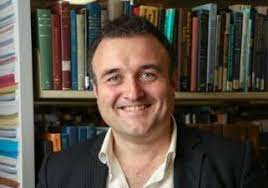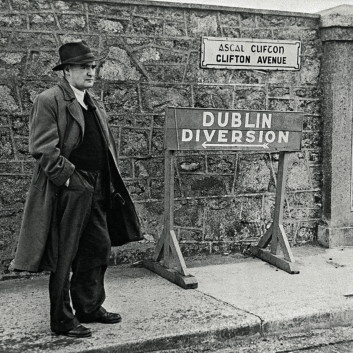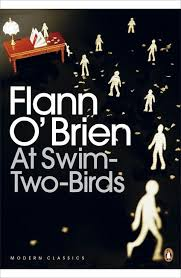

Professor Rónán McDonald holds the Gerry Higgins chair of Irish Studies at the University of Melbourne. He has published widely in the field of modern Irish literature and in the history of criticism and the value of the humanities. Professor McDonald discusses the writer Flann O’Brien below, based on an address he gave at a recent Savage Club event in Melbourne.
Tinteán
How is this writer usually known and why is he important?
Rónán McDonald

As Flann O’Brien – It’s strange how hard to place O’Brien’s face is. Unlike Joyce and certainly Beckett, if he walked into room he would probably go unrecognised. Fitting for someone with so many pseudonyms and personae. He’s quite a self-concealing writer in many ways.
There are two stand out novels At Swim Two Birds(1939) and The Third Policeman (1967). He also wrote voluminous journalism, often of a satirical nature as Myles na gCopaleeen. Other names he used were Brian O’Nolan (his real name), Brian Ó Nualláin, and Brother Barnabas.
Tinteán
He and Joyce are post modernists. Did he like Joyce?
Rónán McDonald
Joyce had a huge influence on Flann O’Brien. Like others of his generation, he struggled to get out from under the Joycean shadow but also mocked Joyce’s popularity, particularly the pomposity of the Joyce ‘cult’.
Tinteán
What are some similarities with both writers?
Rónán McDonald
There is something Kafkaesque about both O’Brien and Joyce.
O’Brien is famous for his bureaucratese. He worked in the Irish Civil Service for many years. There are also some similarities in their biographies, although Joyce was almost thirty years older. Both died in their 50s.
Flann O’Brien was born as Brian O’Nolan in Strabane, County Tyrone. Both parents were from Omagh. His father worked in HM customs service but was also involved in the pre-independence nationalist movement. He was involved in the Gaelic League and Irish was spoken at home. O’Brien was the third of 12 children.
Tinteán
A lot of biographical differences here with Joyce, from different parts of Ireland, but both also coming from large families, Joyce being the eldest of his.
Rónán McDonald
But when O’Brien was 12, the family moved to Dublin where Joyce was already famous. As with Joyce (briefly), Flann O’Brien had a Christian Brothers education in Synge St, then at Blackrock College and then on to University College Dublin where, at one point, he was given a copy of Joyce’s Ulysses by Donogh McDonagh, son of Thomas McDonagh, one of the executed leaders of the Easter Rising in 1916. Unlike Joyce, his literary life was lived in Dublin.
Tinteán
If someone is new to Flann O’Brien the writer, where would be a good start?
Rónán McDonald

His first novel, At Swim Two Birds (1939)was recommended for Longmans by no less a figure than Graham Greene and was an immediate critical success – finding a cult reception with Jorge Luis Borges and others. O’Brien had a copy delivered to Joyce by a friend visiting Paris with the phrase ‘diffidence of the author’ underlined on p.306 – eliciting the comment, ‘That’s a real writer, with a true comic spirit’
He failed to find an American publisher [‘a little too odd for this market’]
Tinteán
What makes At Swim Two Birds remarkable, or ‘odd’?
Rónán McDonald
It’s a truly amazing novel, working entirely with borrowed characters from other fiction and legend, on the grounds that there are already far too many existing fictional characters.
‘Characters should be interchangeable as between one book and another. The entire corpus of existing literature should be regarded as a limbo from which discerning authors could draw their characters as required, creating only when they failed to find a suitable existing puppet. The modern novel should be largely a work of reference. Most authors spend their time saying what has been said before – usually said much better.’
We call this type of writing now ‘Meta-fiction’. There is an unnamed narrator – a student who lives with his respectable bachelor uncle who suspects he does no work. The student believes that ‘one beginning and one ending for a book was a thing I did not agree with’, and he accordingly sets three apparently quite separate stories in motion
Then there are parodies of revivalist discourse – one of the stories the student is writing consists of retelling the Irish legends of Finn McCool and Mad King Sweeney.
While he is not as famous as James Joyce, Flann O’Brien is held in high esteem by many acclaimed writers. The British writer Anthony Burgess once stated, ‘If we don’t cherish the work of Flann O’Brien we are stupid fools who don’t deserve to have great men. Flann O’Brien is a very great man.’ The Welsh writer Dylan Thomas, in a remark that would be quoted on dust-jackets in later editions of the book, said ‘This is just the book to give your sister – if she’s a loud, dirty, boozy girl’.
Tinteán
If this new reader wished to read more, what would you recommend next?
Rónán McDonald

The Third Policeman. I think it’s his masterpiece. Set in rural Ireland and narrated by a dedicated amateur scholar of de Selby (a fictional) scientist and philosopher). The narrator, whose name the reader never learns, is orphaned at a young age. At boarding school, he discovers the work of de Selby and becomes a fanatically dedicated student of it. One night he breaks his leg under mysterious circumstances– ‘if you like, it was broken for me’– and he is ultimately fitted with a wooden leg to replace the original one. On returning to his family home, he meets and befriends John Divney who is in charge of the family farm and pub. Over the next few years, the narrator devotes himself to the study of de Selby’s work and leaves Divney to run the family business.
By the time the narrator is thirty, he has written what he believes to be the definitive critical work on de Selby but does not have enough money to have it published. Divney observes that Mathers, a local man, ‘is worth a packet of potato-meal’ and eventually it dawns on the narrator that Divney plans to rob and kill Mathers. Thus begins a terrible crime and what may be – and I don’t want to provide any spoilers – the beginning of a very bizarre series of events, which defy summary but involve some policemen with a bicycle obsession.
Tinteán
Has Flann O’Brien stood the test of time as Joyce has, in terms of popularity?
Rónán McDonald
Not really. But, a somewhat revival of interest in Flann O’Brien was triggered by the brief appearance of The Third Policeman as an allusion in the American TV series Lost in 2005-06.
Bloomsday fans will find echoes of the ‘çatechism’ chapter of Ulysses and Myles na gCopaleen’s ‘ Çatechism of cliché’. Here are a few lines:
What is a bad thing worse than?
Useless.
If a thing is fraught, what is it fraught with?
The gravest consequences.
What does pandemonium do?
It breaks loose.
And recently, in 2020, Brendan Gleeson (The Banshees of Inisherin) played and sang ‘a pint of plain’ on Ireland’s ‘The Late Late Show’. It was written by O’Brien under his real name, Brian O’Nolan.
The Workman’s Friend –
When things go wrong and will not come right,
Though you do the best you can,
When life looks black as the hour of night –
A pint of plain is your only man.
When money’s tight and hard to get
And your horse has also ran,
When all you have is a heap of debt –
A pint of plain is your only man.
When health is bad and your heart feels strange,
And your face is pale and wan,
When doctors say you need a change,
A pint of plain is your only man.
When food is scarce and your larder bare
And no rashers grease your pan,
When hunger grows as your meals are rare –
A pint of plain is your only man.
In time of trouble and lousey strife,
You have still got a darlint plan
You still can turn to a brighter life –
A pint of plain is your only man
Tinteán
That’s available at https://www.youtube.com/watch?v=SUxqNqyBoGM
Our thanks to Rónán McDonald for this brief insight into Flann O’Brien.